现在进行时专题
现在进行时(单选题 25题 含解析)初中英语专题练习
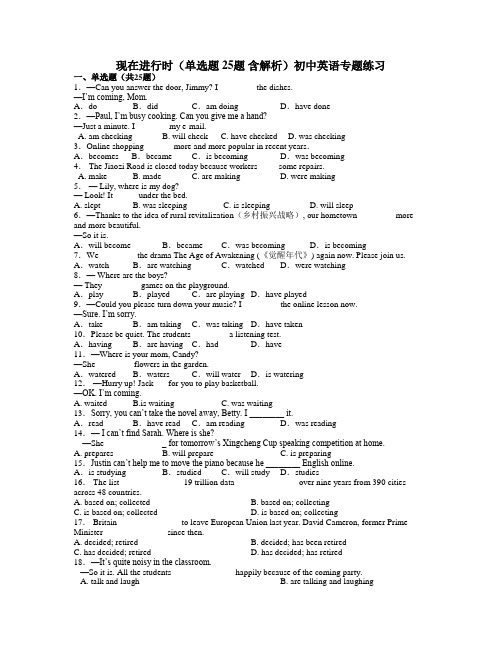
现在进行时(单选题 25题含解析)初中英语专题练习一、单选题(共25题)1.—Can you answer the door, Jimmy? I ________ the dishes.—I’m coming, Mom.A.do B.did C.am doing D.have done2.—Paul, I’m busy cooking. Can you give me a hand?—Just a minute. I _______ my e-mail.A. am checkingB. will checkC. have checkedD. was checking3.Online shopping ______ more and more popular in recent years.A.becomes B.became C.is becoming D.was becoming4. The Jiaozi Road is closed today because workers some repairs.A. makeB. madeC. are makingD. were making5.— Lily, where is my dog?— Look! It _____ under the bed.A. sleptB. was sleepingC. is sleepingD. will sleep6.—Thanks to the idea of rural revitalization(乡村振兴战略), our hometown ________ more and more beautiful.—So it is.A.will become B.became C.was becoming D.is becoming7.We ________ the drama The Age of Awakening (《觉醒年代》) again now. Please join us. A.watch B.are watching C.watched D.were watching8.— Where are the boys?— They ________ games on the playground.A.play B.played C.are playing D.have played9.—Could you please turn down your music? I ________ the online lesson now.—Sure. I’m sorry.A.take B.am taking C.was taking D.have taken10.Please be quiet. The students ________ a listening test.A.having B.are having C.had D.have11.—Where is your mom, Candy?—She ________ flowers in the garden.A.watered B.waters C.will water D.is watering12.—Hurry up! Jack for you to play basketball.—OK. I’m coming.A. waitedB.is waitingC. was waiting13.Sorry, you can’t take the novel away, Betty. I ________ it.A.read B.have read C.am reading D.was reading14.—I can’t find Sarah. Where is she?—She ______________ for tomorrow’s Xingcheng Cup speaking competition at home.A. preparesB. will prepareC. is preparing15.Justin can’t help me to move the piano because he ________ English online.A.is studying B.studied C.will study D.studies16. The list ______________ 19 trillion data ______________ over nine years from 390 cities across 48 countries.A. based on; collectedB. based on; collectingC. is based on; collectedD. is based on; collecting17. Britain ______________ to leave European Union last year. David Cameron, former Prime Minister ______________ since then.A. decided; retiredB. decided; has been retiredC. has decided; retiredD. has decided; has retired18.—It’s quite noisy in the classroom.—So it is. All the students ______________ happily because of the coming party.A. talk and laughB. are talking and laughingC. talked and laughedD. were talking and laughing 19. Jack will go to Australia for further study tomorrow, so he ______________ his luggage at present.A. has packedB. is packingC. packsD. will pack 20.—What’s John doing right now?—He ______________ soccer. He ______________ soccer every Saturday.A. is playing; is playingB. plays; playsC. is playing; playsD. plays; is playing21. No noise, please. Your brother ______________ his homework in the next room.A. doesB. is doingC. didD. has done 22.—I can’t find Jimmy. Where is he?—He ______________ in the garden at the moment.A. worksB. will workC. is working23. In February, Chinese tech company Huawei ______________ Mate X,afoldable(可折叠的)5G mobile phone.A. is introducingB. introducedC. introducesD. was introduced 24.— I went to your office at 9:00 yesterday morning, but you were not in.—Sorry, I ______________ with the manager in the meeting room at that time.A. am talkingB. was talkingC. were talkingD. have talked 25.Look! Some children ________ up the rubbish.A.pick B.picked C.are picking D.will pick【参考答案】一、单选题(共25题)1.C【详解】句意:——吉米,你能去开门吗?我正在洗碗。
小学英语语法专题训练:现在进行时(含答案)
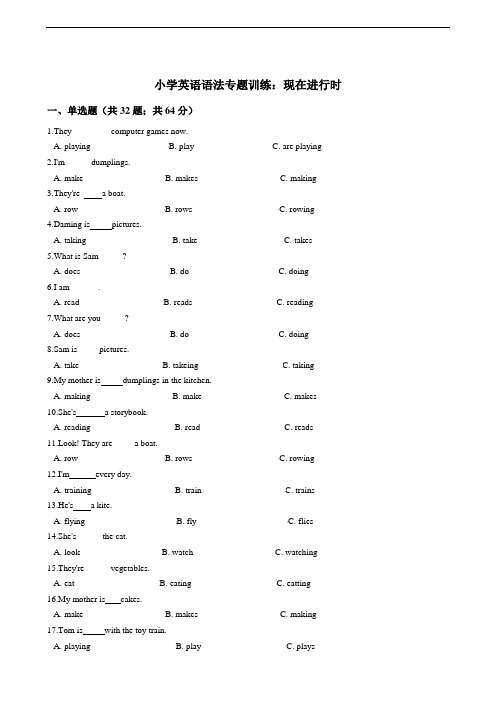
小学英语语法专题训练:现在进行时一、单选题(共32题;共64分)1.They ________ computer games now.A. playingB. playC. are playing2.I'm _____ dumplings.A. makeB. makesC. making3.They're a boat.A. rowB. rowsC. rowing4.Daming is pictures.A. takingB. takeC. takes5.What is Sam _____?A. doesB. doC. doing6.I am ______.A. readB. readsC. reading7.What are you _____?A. doesB. doC. doing8.Sam is ____ pictures.A. takeB. takeingC. taking9.My mother is dumplings in the kitchen.A. makingB. makeC. makes10.She's a storybook.A. readingB. readC. reads11.Look! They are ____ a boat.A. rowB. rowsC. rowing12.I'm every day.A. trainingB. trainC. trains13.He's a kite.A. flyingB. flyC. flies14.She's _____ the cat.A. lookB. watchC. watching15.They're _____ vegetables.A. eatB. eatingC. eatting16.My mother is cakes.A. makeB. makesC. making17.Tom is with the toy train.18.Is Kitty ________with her toys?A. playB. playsC. playing19.Listen! The wind ________ strongly. Don't go outside!A. blowsB. blowC. is blowing20.Sam always _______ basketball after school. But now he _______ football.A. play; is playingB. plays; is playingC. plays; playing21.—________ you listening to music in your room?— No. I'm ________TV.A. Do; watchingB. Are; watchingC. Can; watch22.Is she ________ water in the kitchen?A. drinkingB. drinkC. drinks23.The children ________ a good time at the party now.A. haveB. havingC. are having24.The white rabbit is ________a coat.A. wearingB. wearC. wears25.Look, the girl is the clothes.A. washB. washingC. washes26.The wind ____________.A. is blowB. is blowingC. blow27._______________ this photo, the sun is _______________.A. On; shiningB. On; shineC. In; shiningD. In; shine28.The birds are ____________________ in the trees.A. singB. singsC. sangD. singing29.Why are you _______________?A. laughB. laughsC. laughedD. laughing30.I'm __________________ my homework.A. didB. doingC. doesD. do31.I am ______________ an ice cream.A. hadB. hasC. havingD. have32.The birds are _______________ in the trees.A. singsB. sangC. singingD. sing二、语法填空(共18题;共19分)33.—Where is Mum?—She________ (wash) her hair in the bathroom.34.—Look! What's the man doing?—Oh, he ________ (smoke).35.The car is ________ (go) fast.36.They ________ (look) at the blackboard now.37.—What is the boy doing?—He ________ (skate) there.38.My sister is ________ (wear) a red dress.39.It's three in the afternoon. Jill ________ (paint) in the park.40.Look! What's he ________ (do) in the classroom?41.The wind is ________ (blow).42.The windmill is ________ (move) slowly.43.You are both ________ (have) a good time.44.I'm ________ (enjoy) the sunshine.45.Sam usually________ (play) basketball after school. But now he________ (paint) a picture.46.—Where is your brother—He________ (sit) under the tree.47.The horses are ________ (run).48.he________(learn) English now!49.They are ________ (cook) breakfast in the kitchen now.50.Look! The girls ________ (dance) in the classroom.答案解析部分一、单选题1.【答案】C【考点】现在进行时【解析】【分析】句意:他们……电脑游戏。
现在进行时-仁爱版初中英语语法专题课件 (共19张PPT)

课堂练习
用所给单词的适当形式填空。 1. I_a_m___w_a_t_c_h_in_g_ TV now. (watch) 2. Look,Tom, with his classmates,is__p_la_y_i_ngfootball. (play) 3. It’s nine o’clock. My father ____i_s _w__o_rk_i_n_g___(work) in the office. 4. ---___A_r_e_____they___cl_e_a_n_in__g_(clean) the classroom?
have表有时,没有进行时;have表示吃时,有进行时
5. Lucy __i_s_l_o_o_k_in__g_ at the blackboard carefully. (look) 6. Dinner is ready. The food __l_o_o_k_s_ nice. (look)
look看起来,是系动词,没进行时; look看,是实义动词1. My mother is talking to the teacher.
否定句:My mother is not talking to the teacher
一般疑问句:Is your mother talking to the teacher? 肯定/否定回答:Yes,she is.
现在进行时的判断
1. 句中有“now, look,listen,right now, at the moment 等标志词时常用现在进行时。
Look! The boys are playing football. 2.句中有 “It’s +几点钟” “Keep quiet” “Don’t make noise!” 等标志语时常用现在进行时。
(完整版)现在进行时专题(练习题含答案)
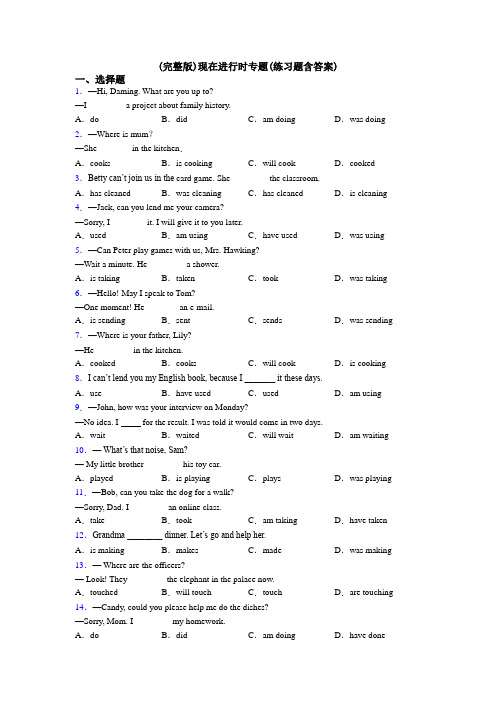
(完整版)现在进行时专题(练习题含答案)一、选择题1.—Hi, Daming. What are you up to?—I ________ a project about family history.A.do B.did C.am doing D.was doing 2.—Where is mum?—She________in the kitchen.A.cooks B.is cooking C.will cook D.cooked 3.Betty can’t join us in the card game. She ________ the classroom.A.has cleaned B.was cleaning C.has cleaned D.is cleaning 4.—Jack, can you lend me your camera?—Sorry, I________ it. I will give it to you later.A.used B.am using C.have used D.was using 5.—Can Peter play games with us, Mrs. Hawking?—Wait a minute. He ________ a shower.A.is taking B.taken C.took D.was taking 6.—Hello! May I speak to Tom?—One moment! He _______ an e-mail.A.is sending B.sent C.sends D.was sending 7.—Where is your father, Lily?—He ________ in the kitchen.A.cooked B.cooks C.will cook D.is cooking 8.I can’t lend you my English book, because I _______ it these days.A.use B.have used C.used D.am using 9.—John, how was your interview on Monday?—No idea. I for the result. I was told it would come in two days.A.wait B.waited C.will wait D.am waiting 10.—What’s that noise, Sam?— My little brother ________ his toy car.A.played B.is playing C.plays D.was playing 11.—Bob, can you take the dog for a walk?—Sorry, Dad. I ________ an online class.A.take B.took C.am taking D.have taken 12.Grandma ________ dinner. Let’s go and help her.A.is making B.makes C.made D.was making 13.— Where are the officers?— Look! They ________ the elephant in the palace now.A.touched B.will touch C.touch D.are touching 14.—Candy, could you please help me do the dishes?—Sorry, Mom. I ________ my homework.A.do B.did C.am doing D.have done15.Excuse me. I really need to go now. My children _____________for me at school.A.are waiting B.waits C.wait D.waited 16.Ladies and gentlemen, please remain in your seats, fasten your seat belt and bring your seat back. The plane________.A.takes off B.is taking off C.has taken off D.took off 17.Listen! Someone __________ in the next room.A.sings B.sang C.was singing D.is singing 18.—It's time for school. Why not get on the bus?—Linda hasn't come yet. I ___________for her.A.have waited B.am waiting C.was waiting D.waited 19.—Mary, let's go to the cinema. There’s a new movie called Avengers IV.—Not now, I _____________ my brother David with his math.A.help B.helped C.am helping D.have helped 20.—Tony, hurry up! We ________ for you now.—Just one minute.A.wait B.waited C.have waited D.are waiting 21.—Tina, let’s go out for shopping.—Sorry, Amy. I __________ my homework.A.do B.am doing C.did22.Joe, answer the phone for me. I ________ how to make dumplings in the kitchen. A.learned B.am learning C.have learned D.learn23.The students in our group ________ the final preparation for the match. We are sure to win. A.made B.are making C.make D.will make 24.You had better not go this way. The workers _________ the road.A.have repaired B.are repairing C.repaired D.will repair 25.—Mom, I’m busy making the bed. Can you give me a hand?— Wait a moment. I ________ the floor.A.am cleaning B.will clean C.was cleaning D.have cleaned 26.—What is your mother doing, Linda?—She ________ dinner in the kitchen now.A.is cooking B.was cooking C.cooks D.cooking 27.—Where is your mother, Kitty?—She ________ dinner in the kitchen.A.cooks B.cooked C.is cooking D.will cook 28.—How do you find your company?—A little worried. We ________ ground as a leader in the field of IT with the others speeding up development.A.are losing B.were losing C.lost D.have lost 29.My oil ________. I must go to the gas station before there is none left.A.has run out B.is running out C.has been run out D.is being run out30.I can’t hear you. I ______ to an English speech.A.am listening B.listen C.was listening 31.—Mary, may I use your ipad for an hour?—Sorry. I ________ on it.A.work B.am working C.have worked D.worked 32.Don’t make any noise, Jim! Your little sister ________ now.A.sleeps B.slept C.is sleeping D.will sleep 33.— Tina, the TV show has already been on. Come and watch together.— Wait a moment. I ________ coffee in the kitchen.A.am making B.have made C.make D.made 34.—Dad, I can’t work out this math problem. Can you give me a hand?— Wait a moment. I ________ on the phone.A.am talking B.will talk C.was talking D.have talked 35.—Ethan, let’s go to pl ay basketball, shall we?—Sorry, I can’t. I ________Yao Ming’s game. Would you mind going later?A.watch B.have watched C.am watching D.was watching 36.— Where is Tom?— Look! He ________with the teacher over there.A.talk B.talks C.talked D.is talking 37.—Where’s Nick?—He ________ classes at school.A.had B.will have C.is having D.was having 38.Sorry, you can’t take the eraser away, Tony. I ________ it.A.have used B.used C.was using D.am using 39.— Ruby, can you help do the dishes?— Just a moment, Mom. I ________ the flowers.A.water B.am watering C.watered D.have watered 40.—Lucy, where is Mimi?—She ________ under the chair.A.sleeps B.slept C.is sleeping D.will sleep【参考答案】一、选择题1.C【详解】句意:——嗨,大明。
专题11-时态二(现在进行时)-备战2023年中考英语一轮复习语法专项练(通用版)(解析版)

专题11-时态二(现在进行时)备战2023年中考英语一轮复习语法专项练(通用版)一、单项选择1.Look! Li Ming ________ a kite in the Guanyin Mountain Park .A.fly B.flew C.will fly D.is flying【答案】D【详解】句意:看!李明在观音山公园放风筝。
考查现在进行时。
根据“Look!”可知此句时态为现在进行时,故选D。
2.Justin can’t help me to move the piano because he ________ English online.A.is studying B.studied C.will study D.studies【答案】A【详解】句意:贾斯汀帮不了我搬钢琴,因为他正在网上学习英语。
考查动词时态。
根据“Justin can’t help me to move the piano”可知,此处是正在网上学习,不能帮忙,可知用现在进行时,其结构是be doing的形式,主语是he,是第三人称单数,be动词用is,study“学习”,是动词,现在分词是studying。
故选A。
3.—Tina, what’s your dad doing?— He ________ my computer.A.repairs B.is repairing C.has repaired D.will repair【答案】B【详解】句意:——Tina, 你的爸爸正在做什么?——他正在修我的电脑。
考查现在进行时。
根据问句“Tina, what’s your dad doing?”可知,本题是问爸爸正在做什么,所以答语要用现在进行时来回答。
故选B。
4.—Can you answer the door, Jimmy? I ________ the dishes.—I’m coming, Mom.A.do B.did C.am doing D.have done【答案】C【详解】句意:——吉米,你能去开门吗?我正在洗碗。
小升初语法讲解现在进行时专题训练(讲义)牛津译林版英语六年级下册

小升初语法讲解现在进行时专题训练(讲义)牛津译林版英语六年级下册知识点讲解现在进行时1. 现在进行时的构成形式:sb. am/ is/ are +doing2. 现在进行时用法:1). 表示现在正在进行或发生的动作。
例:Jerry is reading a book now.2). 表示当前一段时间内的活动或现阶段正在进行的动作。
例:They are preparing for their holiday these days.3. 动词的现在分词ing变化规则1). 一般情况下,动词后直接加ing. Eg.: play playing2). 以不发音的字母e结尾的动词,先去掉字母e, 加ing. Eg.: write writing3). “辅元辅”结构,双写尾辅音字母,再加ing. Eg.: stop stopping4). 以ie结尾的动词,ie变y加ing. Eg.: lie lying, die dying, tie tying4. 相关句型1) 一般疑问句:Is/ Are +主语+doing …?2) 否定句:主语+am/ is/ are +not doing…精选精练1.Mary can’t ______ her bag. Now she ______. ()A.find; is looking for it B.find; looks for it C.look for; is finding it 2.—__________ your parents __________ the house? ()—Yes, they are.A.Are; cleaning B.Do; clean C.Do; cleaning3.—______ you listening to music? ()—No, I’m watching TV.A.Do B.Are C.Be D.Is4.Don’t shout. My mother _______. ()A.sleeps B.is sleeping C.sleeping5.—Who _____ lunch? ()—My dad ______.A.cooks; is B.cook; does C.is cooking; is 6.—What’s Jill doing? ()—He’s ______ his pictures ______ his friends.A.show; to B.showing; to C.showing; for7.It is often ______ in the UK. Look, it is ______ now. ()A.rainy; rain B.rainy; raining C.rains; raining 8.—What’s Mike doing? ()—He’s _______ his toy ship _______ his classmates.A.show; for B.showing; for C.showing; to 9.—What are you doing? ()—I’m ______ my hands, because it’s time ______ have lunch.A.washing; to B.washing; for C.to wash; to10.Liu Tao ______ Mike ______ his holiday. ()A.is asking; to B.asks; for C.is asking; about 11.Those young ladies are sitting on the grass and ______ now. ()A.chat B.chats C.chatting12.Look! The horses ______ through the grass. ()A.run B.are running C.ran13.Tim, ______ shout in the classroom. We ______ a Chinese lesson now. () A.doesn’t; had B.don’t; had C.don’t; are having D.doesn’t; are having14.The girl is ______ beautifully. And she can dance ______, too. ()A.singing; beautifully B.sing; beautiful C./; beautifully 15.Bobby is ________ Wendy _________ her birthday party. ()A.asked; with B.asking; with C.asked; for D.asking; about 16.Chinese New Year is ________. ()A.e B.ing C.eing17.Look! The kite is ________ high. ()A.flying B.flew C.flies18.It often ________ here in summer. Now it’s ________. ()A.raining; rainy B.rains; rainingC.rainy; raining D.raining; raining19.Mike is _____ his toy ship _____ his friends. ()A.showing; to B.showing; for C.show; to20.It’s nine o’clock! The students _____ an English lesson. ()A.have B.having C.are having D.are have 21._______ your sister listening to music in her bedroom? ()A.Are B.Does C.Is D.Do 22.—What are you doing? ()—I am ________ a card.A.makes B.making C.make 23.—What’s Tim doing? ()—He’s _____ his toy ship _____ his classmates.A.show; for B.showing; to C.showing; for 24.Don’t shout, Tim. Your father ______. ()A.sleep B.sleepy C.is sleeping D.to sleep 25.The children are ______ carefully, but they can’t ______ anything. () A.listening; hear B.listening; listen C.hearing; hear 26.Look! They’re _____. ()A.siting quietly B.sit quietly C.sitting quietly 27.The driver is ______ the traffic lights and ______ the policeman. () A.points at; talks with B.pointed at; talked with C.pointing to; talking to 28.Joe ___________ his photos ___________ his friends. ()A.show; to B.is showing; to C.is showing; for 29.My parents _______ my little sister to talk now. ()A.is teaching B.are teaching C.teaches30.Look at the giraffes. They ______ leaves on the trees. ()A.is eating B.eat C.are eating D.to eat 31.Mike ______ football well. Look! He ______ it with friends there. () A.play; is playing B.plays; is playing C.plays; playing 32.Mike with his friends_______ basketball. ()A.is playing B.playing C.are playing33.—Where’s Liu Tao? ()—He ________ his grandpa in the garden.A.helps B.helping C.is helping34.—________ is Mary? ()—She ________ in the bedroom.A.What; is sleeping B.Where; is sleeping C.Where; sleeps 35.—Where is Dan? ()—He __________ in the playground. He __________ there every morning.A.runs; runs B.is running; runs C.is running; is running 36.Nancy _________ her pencil now. But she can’t _________ it. ()A.looks for; find B.finds; look forC.is looking for; find D.finds; looking for37.Chinese New Year _______ soon. ()A.e B.es C.is ing D.is going to e 38.She ______ on a new dress now. ()A.tries B.is trying C.tried D.is going to try 39.He usually _________ books after dinner. Look! He _________ now. () A.read; is reading B.looks; is lookingC.reads; is reading D.watches; is watching参考答案:1.A【详解】句意:玛丽找不到她的包了。
小学语法专题:现在进行时全练全析
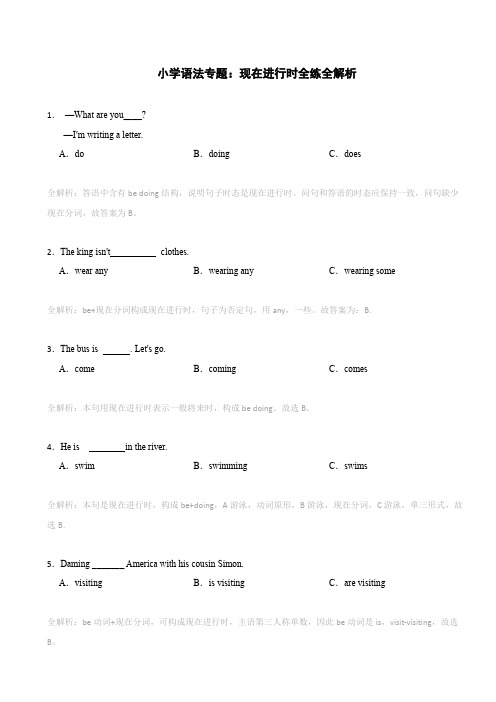
小学语法专题:现在进行时全练全解析1.—What are you____?—I′m writing a letter.A.do B.doing C.does全解析:答语中含有be doing结构,说明句子时态是现在进行时。
问句和答语的时态应保持一致,问句缺少现在分词,故答案为B。
2.The king isn't clothes.A.wear any B.wearing any C.wearing some全解析:be+现在分词构成现在进行时,句子为否定句,用any,一些。
故答案为:B.3.The bus is . Let's go.A.come B.coming C.comes全解析:本句用现在进行时表示一般将来时,构成be doing。
故选B。
4.He is in the river.A.swim B.swimming C.swims全解析:本句是现在进行时,构成be+doing,A游泳,动词原形,B游泳,现在分词,C游泳,单三形式,故选B.5.Daming _______ America with his cousin Simon.A.visiting B.is visiting C.are visiting全解析:be动词+现在分词,可构成现在进行时,主语第三人称单数,因此be动词是is,visit-visiting,故选6.What______________ you______________?A.are; do B.are; doing C.do; doing D.does; do全解析:故选B。
7.They ____ a lion dance now.A.are watching B.watched C.are going to watch全解析:根据now判断该句子是现在进行时,其构成是“主语+be+doing+其它”,主语是they第三人称复数,因此be动词用are,故选A。
中考英语专题30 现在进行时100题

A.runsB.is runningC.was runningD.ran
18.(2022·湖南株洲·统考中考真题)Listen! They ________ songs for the 100 birthday of the CCYL(中国共青团).
A.are singingB.sangC.will sing
—OK. I’ll ring you up later.
A.watchB.watchedC.am watchingD.was watching
10.(2023·湖南怀化·统考中考真题)Look! Our Chinese teacher ______ a talk in the meeting room.
A.preparesB.is preparingC.was preparing
7.(2023·黑龙江绥化·统考中考真题)—Where is your father, Kate?
—Look, mom! He ________ a newspaper in the garden.
A.readsB.readC.is reading
—We ________ for an office party this Friday evening. There will be about thirty people, and I am the organizer.
A.prepareB.have preparedC.are preparingD.were preparing
备战2024中考英语单项选择百题分类训练
高考英语现在进行时专题训练答案
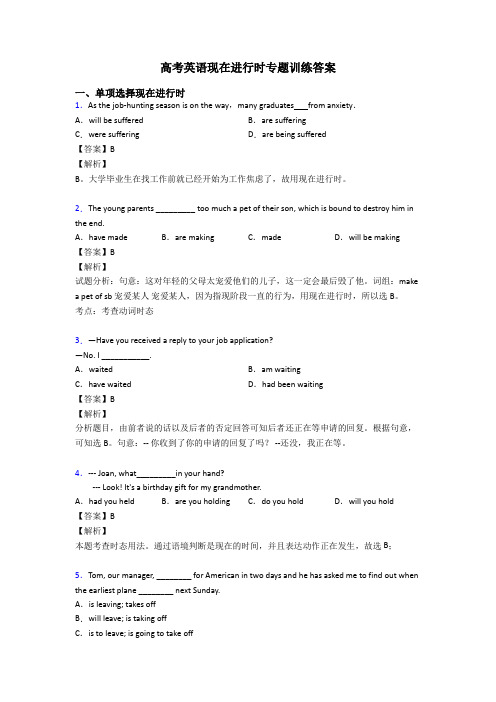
高考英语现在进行时专题训练答案一、单项选择现在进行时1.As the job-hunting season is on the way,many graduates from anxiety.A.will be suffered B.are sufferingC.were suffering D.are being suffered【答案】B【解析】B。
大学毕业生在找工作前就已经开始为工作焦虑了,故用现在进行时。
2.The young parents _________ too much a pet of their son, which is bound to destroy him in the end.A.have made B.are making C.made D.will be making【答案】B【解析】试题分析:句意:这对年轻的父母太宠爱他们的儿子,这一定会最后毁了他。
词组:make a pet of sb 宠爱某人宠爱某人,因为指现阶段一直的行为,用现在进行时,所以选B。
考点:考查动词时态3.—Have you received a reply to your job application?—No. I ___________.A.waited B.am waitingC.have waited D.had been waiting【答案】B【解析】分析题目,由前者说的话以及后者的否定回答可知后者还正在等申请的回复。
根据句意,可知选B。
句意:-- 你收到了你的申请的回复了吗? --还没,我正在等。
4.--- Joan, what_________in your hand?--- Look! It's a birthday gift for my grandmother.A.had you held B.are you holding C.do you hold D.will you hold【答案】B【解析】本题考查时态用法。
(英语)英语现在进行时专题训练答案及解析

(英语)英语现在进行时专题训练答案及解析一、初中英语现在进行时1.Listen, someone ________ in the next room.A. singsB. is singingC. sangD. sing【答案】 B【解析】【分析】句意:听,有人在隔壁唱歌。
listen,快听,是现在进行时的标志,be doing,故谓语是is singing,故选B。
【点评】考查现在进行时,注意listen是现在进行时的标志。
2.It's six o'clock in the morning. Many people ______ in the park.A. are dancingB. danceC. is dancingD. dances【答案】A【解析】【分析】句意:现在是早上六点钟。
许多人在公园里跳舞。
本句指现在六点时,人们正在做的事情,句子用现在进行时态,be+动词ing。
People人们,是一个复数名词,be动词用复数are。
故选A.【点评】本题考查现在进行时。
3.—What is your mother doing, Linda?—She ___________dinner in the kitchen now.A. is cookingB. was cookingC. cookD. cooking【答案】 A【解析】【分析】句意:——Linda,你的母亲正在做什么?——她现在正在厨房里做晚饭。
根据上文What is your mother doing, Linda?和下文时间状语now,可知下文用现在进行时。
其结构是be(am/is/are)现在分词。
主语she,第三人称单数,be要用is,cook的现在分词cooking,故选A。
【点评】考查现在进行时的构成和用法。
根据语境和时间状语确定动词的时态。
4.— Where is Linda?— She __________ a TV program about a missing elephant.A. watchesB. will watchC. watchedD. is watching【答案】 D【解析】【分析】句意:——琳达在哪里?——她正在看一个关于失踪大象的电视节目。
现在进行时专题

现在进行时专题知识讲解一、构成be (am,is,are) + 现在分词(动词+ ing)现在分词的构成规则:1. 一般情况:动词+ingwork—working go—going2. 以不发音的-e结尾:去掉-e再加-inghave—having take—taking3. 以重读闭音节结尾,结构是“辅元辅”的:双写词尾辅音字母再加-ingcut—cutting run—running二、形式肯定句:I am studying.否定句:I am not studying.疑问句:Am I studying?简要回答:Yes,I am/ No,I am not.注意:I am studying 可以缩写为I’m studying,但是Yes,I am. 一般不缩写为Yes,I’m. 因为I’m后面一般都要接表语,而表语不能为空。
三、用法1. 表示正在进行的动作例如:I am writing a letter.我正在写一封信。
They are learning English.他们正在学英语。
Is it raining now?现在下雨吗?The boys are helping their mother.孩子们正在给母亲帮忙。
2. 表示最近一直在做的一件事(但说话时不一定在进行)。
例如:I am reading Harry Potter these days.最近我在读《哈里·波特》。
Are you working hard this term?这学期你学习用功吗?He is writing a novel.他正在写一本小说。
3. 表示即将发生的动作。
例如:We are going to watch a movie tonight.晚上我们将要去看电影。
John is coming here next week and will stay here until May.约翰下周将要来这并呆到五月份。
专题01现在进行时(原卷版)
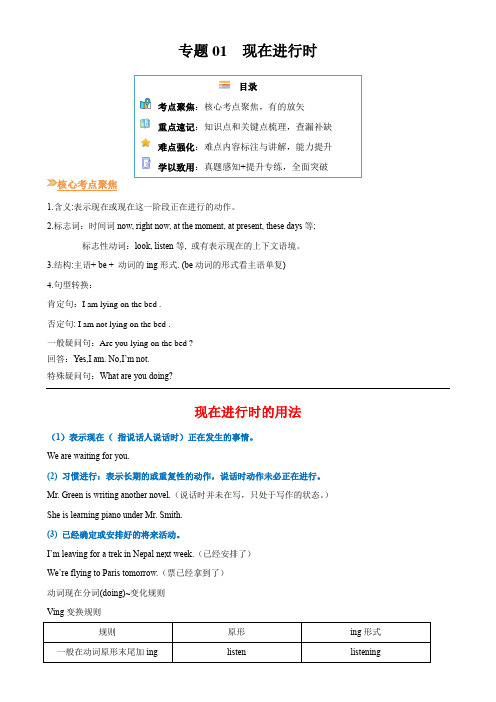
专题01 现在进行时目录考点聚焦:核心考点聚焦,有的放矢重点速记:知识点和关键点梳理,查漏补缺难点强化:难点内容标注与讲解,能力提升学以致用:真题感知+提升专练,全面突破核心考点聚焦1.含义:表示现在或现在这一阶段正在进行的动作。
2.标志词:时间词now, right now, at the moment, at present, these days等;标志性动词:look, listen等, 或有表示现在的上下文语境。
3.结构:主语+ be + 动词的ing形式. (be动词的形式看主语单复)4.句型转换:肯定句:I am lying on the bed .否定句: I am not lying on the bed .一般疑问句:Are you lying on the bed ?回答:Yes,I am. No,I’m not.特殊疑问句:What are you doing?现在进行时的用法(1)表示现在(指说话人说话时)正在发生的事情。
We are waiting for you.(2) 习惯进行:表示长期的或重复性的动作,说话时动作未必正在进行。
Mr. Green is writing another novel.(说话时并未在写,只处于写作的状态。
)She is learning piano under Mr. Smith.(3) 已经确定或安排好的将来活动。
I’m leaving for a trek in Nepal next week.(已经安排了)We’re flying to Paris tomorrow.(票已经拿到了)动词现在分词(doing)~变化规则Ving变换规则规则原形ing形式一般在动词原形末尾加ing listen listening现在进行时&一般现在时(知识对比讲解)一、定义对比现在进行时:★ 表示现在或现阶段正在进行/发生的动作或存在的状态例:I am doing homework.一般现在时:★ 表示经常性/习惯性/规律性/真理性的动作或存在的状态例:I usually go to school by bike.二、标志词对比现在进行时的标志词:★now★right now★look ★listen★at this/the moment一般现在时的标志词:★often/usually/always/sometimes等频率副词★every day/night/morning等真题感知一、单项选择1.(2022上·江苏无锡·七年级统考期末)—Is that girl with glasses your sister?—No. My sister __________ table tennis with her classmates over there.A.practise B.practises C.is practising D.practising 2.(2022上·江苏盐城·七年级统考期末)— Be quiet! Your little brother ________ in the bedroom.— OK.A.sleeps B.is sleeping C.sleep D.to sleep3.(2022上·江苏南通·七年级统考期末)— ________ your mother free now?— I’m afraid not. She ________ the house for the ing Spring Festival these days.A.Does; cleans B.Does; is cleaning C.Is; is cleaning D.Is; cleans4.(2022上·江苏盐城·七年级统考期末)—Where is Mrs. Smith?—She ________ tea for us in the kitchen.A.making B.makes C.made D.is making5.(2022上·江苏南京·七年级校联考期末)—Amy, can I use your puter?—I’m afraid you can’t. I ________ on it.A.work B.don’t work C.am working D.am not working6.(2022上·江苏南京·七年级统考期末)—Look! Tom with her mum ________ a New Year present list.—He has a big family and it’s always exciting to choose presents for everyone.A.make B.makes C.is making D.are making7.(2022上·江苏常州·七年级统考期末)—________ reading fun, Jack?—Yes. I ________ some reading after school every day.A.Does; do B.Does; does C.Is; do D.Is; does8.(2022上·江苏盐城·七年级校联考期末)—Who at the door, dad?—Just a minute. See who it is through the hole first.A.knocks B.knock C.is knocking D.will knock9.(2022上·江苏南通·七年级统考期末)—Hi, Linda, can I ask you a question?—Of course. I ________.A.listen B.am listening C.hear D.am hearing10.(2022上·江苏泰州·七年级校考期末)Mrs. Yang ________ dancing for an hour on Saturdays. Look! she ________ to music.A.practises; dances B.practises; is dancingC.is practising; is dancing D.is practising; dances11.(2022上·江苏淮安·七年级统考期末)Don’t talk. The baby ________.A.sleeps B.is sleeping C.sleeping D.to sleep12.(2022上·江苏·七年级统考期末)—Where is Mrs Smith?—She ________ tea for us in the kitchen.A.makes B.makes C.made D.is making13.(2022上·江苏扬州·七年级统考期末)—Millie, can you help me answer the phone? I ________ the room.—I’m ing, Mum.A.clean B.cleans C.am cleaning D.cleaned14.(2022上·江苏连云港·七年级统考期末)— Where’s your brother? I can’t find him.— He ________ a football match in his room.A.watch B.watches C.is watching D.are watching15.(2022上·江苏盐城·七年级景山中学校考期末)—Listen! Who ________ in the music room?—It must be our monitor. She enjoys singing very much.A.sings B.sing C.is singing D.sang16.(2022上·江苏南通·七年级统考期末)—_________ your sister making a birthday cake all the afternoon?—Yes.A.Is B.Are C.Do D.Does17.(2022上·江苏扬州·七年级统考期末)—Who _________ at the door, mum?—Wait a moment. You should see who it is through the hole first.A.knocks B.knock C.is knocking D.will knock18.(2022上·江苏南通·七年级统考期末)—What a nice day! Let’s go swimming, shall we?—Just a minute. I ________ the car for my mother.A.am washing B.wash C.will wash D.washes19.(2022上·江苏盐城·七年级统考期末)Dad usually ________ some reading after supper. Look, he ________ a newspaper now.A.does; reads B.is doing; readsC.does; is reading D.is doing; is reading20.(2022上·河南郑州·七年级郑州外国语中学校考期末)Shhh! Don’t talk so loudly, honey. Your sister________ an English class on Dingding.A.has B.had C.having D.is having提升专练二、用所给单词的正确形式填空with their teacher.22.(2022上·江苏无锡·七年级统考期末)Tom is (plan) to spend his winter holiday with his grandparents in the village.23.(2022上·江苏盐城·七年级统考期末)Is Eddie (lie) on the bed and watching TV the whole morning?。
现在进行时专题知识
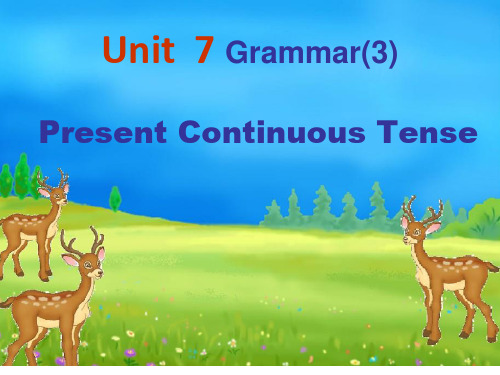
days.
3.目前进行时表将来,主要表达按计划或安 排要发生旳动作: I’m leaving tomorrow. 我明天走。 I’m not going out this evening. 今晚我不准备出去。
They are cooking. Are they cooking? Yes, they are. / No, they aren’t.
Present continuous tense 目前进行时
Questions 特殊疑问句
Questions with question words:
e.g. ❖ What are you doing? ❖ Why is the baby crying? ❖ When are the children leaving? ❖ Where are you going?
have
having
live
living
write
writing
drive driving
ride
riding
move
moving
Present continuous tense 目前进行时
以重读、“辅元辅”构造结尾旳动词需要 双写最终一种字母再加ing。
swim m ing
swimming
Practice
(read)
reading
4 The man ____‘_s_/_is_____ a story. (write) 5 I ___‘__m_/_a_m_w_r_it_inwgith my sister. (run) 6 We ‘__rre_u/_nan_ri_ne_gp_l_a_yi_n_g tennis now. (play)
(英语) 英语现在进行时专题练习(及答案)含解析

(英语)英语现在进行时专题练习(及答案)含解析一、单项选择现在进行时1.— Why do you do volunteer work in the North—West?— I_____ to improve the lives of the children there through my efforts.A.was trying B.have triedC.am trying D.tried【答案】C【解析】试题分析:考查时态。
句意:--你为什么选择去西北地区做志愿服务?--通过我的努力,我正在努力改善那里孩子们的生活。
过去进行时用来指过去的某个时刻正在发生的事情,根据第一句中的Why do you...可知,这里不用过去的时态,排除A、D;现在完成时表示发生在过去的事情对现在造成的结果,参加志愿服务这件事并未结束,因此不用现在完成时,故选C。
考点:考查时态2.I ________ for Beijing next Saturday. Do you know when the earliest plane ________ on Saturday?A.am leaving; takes offB.Leave; takes offC.leave; is taking offD.am leaving; is taking off【答案】A【解析】答案:A考查时态。
第一空用现在进行时表将来;第二空飞机航班时刻表用一般现在时。
3.One of the firms I applied to has offered me a job but I _____ my options open until I hear from the others.A.have kept B.will have keptC.am keeping D.keep【答案】C【解析】试题分析:考查动词时态。
句意:我申请了几家公司,其中一家答应给我一份工作,但我想等另外几家公司有了回音再作决定。
中考复习专题现在进行时专项练习(附答案)
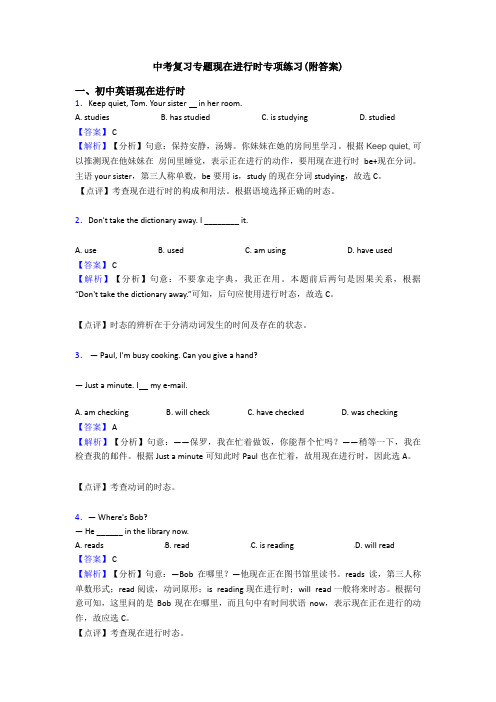
【答案】A
【解析】【分析】句意:他们明天有个考试,所以他们现在正在努力学习和为它准备。A准备,B支付,C穿上,D照顾。根据They are going to have a test tomorrow可知,正在为考试做准备。故选A。
—Thank you, Mum.
A. drive B. drove C. have driven D. are driving
【答案】D
【解析】【分析】句意:——琳达,父亲已经完成工作了我们正在开车去体育场接你。——谢谢,妈妈。根据Dad has finished his work父亲现在完成工作了,可知现在就要开车去接你,所以句子时态是现在进行时表示将来的动作,故选D。
【点评】考查现在进行时的构成和用法。根据语境选择正确的时态。
2.Don't take the dictionary away. I ________ it.
A. use B. used C. am using D. have used
【答案】C
【解析】【分析】句意:不要拿走字典,我正在用。本题前后两句是因果关系,根据“Don't take the dictionary away.”可知,后句应使用进行时态,故选C。
【点评】考查短语辨析,注意理解短语意思,理解句意。故选A。
8.Look! The police ________ the food onto the bank of the river.
A. am carrying B. is carrying C. are carrying D. are carried
专项训练现在进行时专题(含答案)
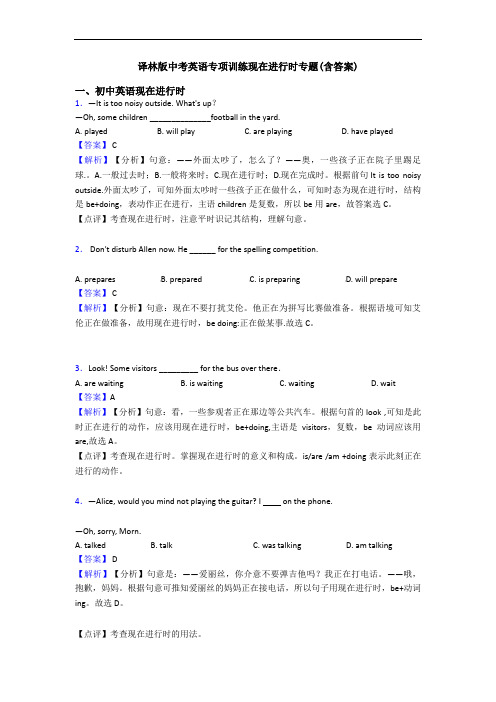
译林版中考英语专项训练现在进行时专题(含答案)一、初中英语现在进行时1.—It is too noisy outside. What's up?—Oh, some children ______________football in the yard.A. playedB. will playC. are playingD. have played【答案】 C【解析】【分析】句意:——外面太吵了,怎么了?——奥,一些孩子正在院子里踢足球.。
A.一般过去时;B.一般将来时;C.现在进行时;D.现在完成时。
根据前句It is too noisy outside.外面太吵了,可知外面太吵时一些孩子正在做什么,可知时态为现在进行时,结构是be+doing,表动作正在进行,主语children是复数,所以be用are,故答案选C。
【点评】考查现在进行时,注意平时识记其结构,理解句意。
2. Don't disturb Allen now. He ______ for the spelling competition.A. preparesB. preparedC. is preparingD. will prepare【答案】 C【解析】【分析】句意:现在不要打扰艾伦。
他正在为拼写比赛做准备。
根据语境可知艾伦正在做准备,故用现在进行时,be doing:正在做某事.故选C。
3.Look! Some visitors _________ for the bus over there.A. are waitingB. is waitingC. waitingD. wait【答案】A【解析】【分析】句意:看,一些参观者正在那边等公共汽车。
根据句首的look ,可知是此时正在进行的动作,应该用现在进行时,be+doing,主语是visitors,复数,be 动词应该用are,故选A。
【点评】考查现在进行时。
- 1、下载文档前请自行甄别文档内容的完整性,平台不提供额外的编辑、内容补充、找答案等附加服务。
- 2、"仅部分预览"的文档,不可在线预览部分如存在完整性等问题,可反馈申请退款(可完整预览的文档不适用该条件!)。
- 3、如文档侵犯您的权益,请联系客服反馈,我们会尽快为您处理(人工客服工作时间:9:00-18:30)。
现在进行时专题编稿:郭宇审稿:贾巍责编:夏芳莲知识讲解一、构成be (am,is,are) + 现在分词(动词+ ing)现在分词的构成规则:1. 一般情况:动词+ingwork—working go—going2. 以不发音的-e结尾:去掉-e再加-inghave—having take—taking3. 以重读闭音节结尾,结构是“辅元辅”的:双写词尾辅音字母再加-ingcut—cutting run—running二、形式肯定句:I am studying.否定句:I am not studying.疑问句:Am I studying?简要回答:Yes,I am/ No,I am not.注意:I am studying 可以缩写为I’m studying,但是Yes,I am. 一般不缩写为Yes,I’m. 因为I’m后面一般都要接表语,而表语不能为空。
三、用法1. 表示正在进行的动作例如:I am writing a letter.我正在写一封信。
They are learning English.他们正在学英语。
Is it raining now?现在下雨吗?The boys are helping their mother.孩子们正在给母亲帮忙。
2. 表示最近一直在做的一件事(但说话时不一定在进行)。
例如:I am reading Harry Potter these days.最近我在读《哈里·波特》。
Are you working hard this term?这学期你学习用功吗?He is writing a novel.他正在写一本小说。
3. 表示即将发生的动作。
例如:We are going to watch a movie tonight.晚上我们将要去看电影。
John is coming here next week and will stay here until May.约翰下周将要来这并呆到五月份。
4. 表示总是出现的事情(说话人可能对此有点烦)。
例如:He is always borrowing money from me.他老是找我借钱。
We are constantly eating food.我们一直在吃东西。
四、辨析1. be going to 和will 的区别be going to 和will 都可以表示对将来的推测,但是表达的意义有不同:will表示的是该推测更倾向于说话人的看法,而be going to 则表示该推测基于现实证据、现象等。
试比较:It will rain.It is going to rain.第一句可能是说话人的随意猜测,而第二句则可能是说话人看到天上有积雨云、蚂蚁搬家等现象后才发表的看法。
但有时这两种表示法也没有什么区别。
2. 一般现在时和现在进行时的区别一般现在时表示经常性动作,现在进行时表示现在或现在阶段正在发生的动作。
例如:He studies hard.他(一贯)学习努力。
He is studying hard.他正在努力学习(可能马上要考试了)。
一般现在时表示现在发生的动作(强调动作的整体性),现在进行时表示眼前看的见的动作。
例如:Boats pass under the bridge.船从桥下通过。
The boat is passing under the bridge.船正从桥下经过。
一般现在时不带感情色彩,现在进行时带感情色彩(往往与always,constantly等副词连用)。
例如:He borrows money from me.他找我借钱。
He is always borrowing money from me.他老是找我借钱。
练习:一、用括号内的词语回答提问:What are you doing now?I’m _________________.1. (read a book)2. (walk through the park)3. (open a bottle)4. (drink tea)5. (have lunch)6. (sit in a chair)7. (look at some pictures)8. (wait for a bus)9. (listen to the radio)10. (watch television)二、单项选择。
1. —Where are the runners?—Over there. They _______ warming-up exercises.A. is doingB. doC. are doingD. does2. —What are you doing there?—I’m _______ my English book, but I can’t _______ it anywhere.A. finding, look forB. looking for, findC. finding, look upD. looking up, find3. —_____________________?—She is watching a basketball match on TV.A. What does she doB. What is she going to doC. What is she doingD. What does she like doing4. —_______ your pen friend _______ Chinese, now?—Yes. He studies very hard.A. Do, studyB. Does, studyingC. Are, studiesD. Is, studying5. Look, Damin _______ in the sun and enjoying the sun.A. is lyingB. liesC. lieD. are lying三、用所给动词的适当形式填空。
1. What _______ your father _______ (do) now?2. What _______ your mother often _______ (do) on Sundays?3. Look! The boys _______ (play) football there.4. There _______ (be) a lot of water in the glass.5. Jack and Tony _______ (have) a lot of friends in Beijing.6. Can she _______ (help) us with our English?四、完形填空。
On Sunday morning,Mike is 1blue trousers and a white shirt,and his little sister,Kate,is 2 a yellow skirt and 3red sweater. They want to 4.5the shop,there 6many things and many people. They are men and women,old and 7. They all want to 8something. There are apples,pears and oranges. Mike likes banana and pears,but Kate 9to have some oranges and apples. Bananas and oranges are very expensive. Then they buy 10apples and pears and go home.1. A. putting B. wear C. having D. in2. A. wearing B. having C. putting D. putting on3. A. an B. a C. the D. \4. A. go shopping B. go shop C. go to school D. go to shop5. A. To B. On C. In D. At6. A. are B. is C. am D. be7. A. new B. small C. young D. big8. A. ear B. buy C. look D. find9. A. like B. asks C. wants D. likes10. A. a little B. some C. much D. any五、阅读理解。
Small children often laugh at the short ones or at someone who isn’t dressed as well as they are. But as they grow up,they learn not to hurt other people’s feelings by laughing at their problems. They learn to laugh at other things. Most important,they learn to laugh at themselves.Suppose you’re playing a game. You make a mistake and lose. Do you become angry? Or can you laugh at yourself and hope to do better next time? Suppose you are at a special dinner. You at times spill some food. Why keep worrying about how clumsy you looked? Why not laugh it off and enjoy yourself any way? If you can,it’s a good thing you’ve really grown up.1. This article is mostly about _______.A. why laughter is good for your bodyB. what you should laugh atC. where you may laughD. where you may laugh2. The writer says small children laugh at people who ___________.A. have problemsB. not to be worriedC. dress wellD. play games3. The writer shows hot laughter could help you ___________.A. not to spill foodB. not to be worriedC. not to enjoy yourselfD. to grow up4. The most important thing is to learn how to laugh at __________.A. jokesB. picturesC. childrenD. yourself5. The writer shows how laughter could help you no to ___________.A. make a mistakeB. lose againC. become angryD. try again参考答案:一、1. I’m reading a book.2. I’m walking through the park.3. I’m opening a bottle.4. I’m drinking tea.5. I’m having lunch.6. I’m sitting in a chair.7. I’m looking at some pictures.8. I’m waiting for a bus.9. I’m listening to the radio.10. I’m watching television.二、1-5 CBCDA三、1. is; doing2. does; do3. are playing4. is5. have6. help四、1-5 DABAD 6-10ACBCB五、1-5 BABDC。
